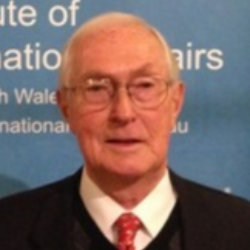GEOFF MILLER. The Good American.
October 22, 2019
Even a good American uses language in regard to China that raises questions about Americas stance in its envisaged long existential struggle with China.
Recently Australia has enjoyed a visit from Nicholas Burns, distinguished former US diplomat and Under-Secretary of State, and now a Harvard Professor. He was brought to Australia by the Lowy Institute, and visited a number of Australian cities. He spoke to the Lowy Institute in Sydney on 8 October, and an article by Peter Hartcher based on an interview with him appeared in the SMH of 15 October.
Its fair to say that Burns comes across as a good American, steeped in liberal internationalism, and well aware of the adverse reaction internationally to President Trumps erratic, untruthful and disloyal behaviour. But, Burns said, all is not lost; there are many more in the US like him, and he, as an adviser to Joe Biden, is making it his business to see that they triumph at the 2020 Presidential election.
Most of us would say that that indeed is a consummation devoutly to be wished, but what would it entail in terms of US policies towards the rest of the world? Perhaps partly because he was speaking in Australia, Burns stressed that the US-China relationship, or competition, would be the most consequential international issue for the future. He said that this would be the case whoever becomes US President after Trump, and that what is involved is a long-term competition for power.
This, he said, would be played out on four battlefields— military, advanced technologies, economic and trade, and ideas—democracy versus authoritarianism. But despite the battlefields analogy, China would be an adversary or competitor, not an enemy. In certain fields it could be a co-operator, for example in the fields of climate change, the structure of the world trade system, and controlling pandemics.
Despite these possible fields of cooperation Burns made it clear that he sees China as on the other side from Pacific democracies like the Quad—the US, Japan, India and Australia—which he sees as very much alive and relevant. (However, its worth noting that shortly after Burns made this reaffirmation Indian Prime Minister Modi hosted President Xi Jinping in South India.)
Burns wording in regard to the first two of his four battlefields that Burns wording raises some questions. He said that of the four the first, military, was the most important, and that this meant that the US had to remain the no.1, prime or predominant power in the Western Pacific. He said that the US military had a plan for this, involving sea and air power, and making Taiwan a tough nut to crack. This also involved being the leader in the weaponization of advanced technology.
I must say I found it depressing to hear a representative of US liberal internationalism say that the most important sphere of competition between his country—still by far the worlds leading military power —and China is the military one; that to succeed in this it is crucial to lead in weaponizing advanced technologies such as a.i., quantum science and biotech; that a prime objective will be to remain the predominant power in the Western Pacific, i.e. off Chinas coast; and that we, Japan and India should join it in these objectives.
This is a barren recipe, ignoring the fact that while China is undoubtedly rising across a broad front, the US should surely aim, and be confident that it is able, to compete with it in terms of what is the most desirable and effective society, without feeling it has to rely on military predominance.
It reminds one of the blunter, and more extreme, formulation given in both private and public by University of Chicago Professor John Mearsheimer when in Australia earlier in the year. He was asked why it was necessary for the US to regard China as a foe just because it was successful and growing. He replied that the US can not tolerate a peer competitor.
For years now the debate in Australia has been about how to respond to the changed and still changing power structure in the Western Pacific, and the need to accommodate and make room for the aspirations that come inevitably with Chinas rise. Despite Burns ruling out China as an enemy, if his and Mearsheimers views are typical it seems that the US is still a long way from a realistic readiness to reach such an accommodation.
Geoff Miller is a former Australian diplomat and government official.
